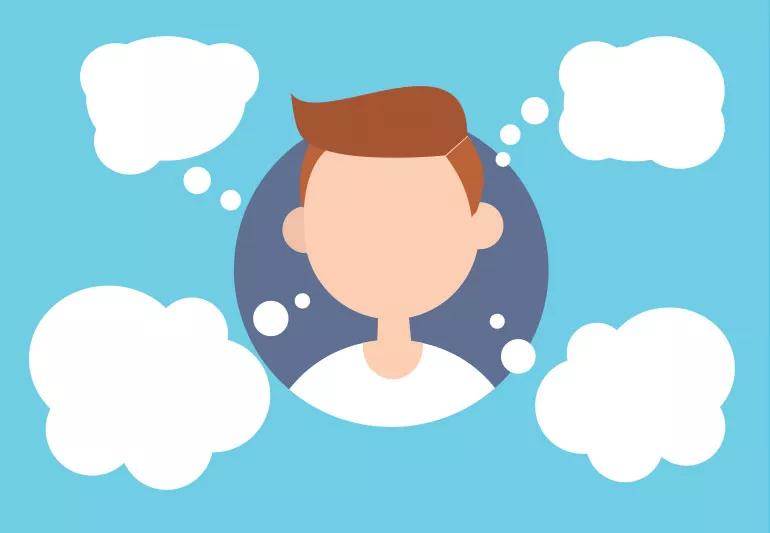How much can your mind really take?

Image content: This image is available to view online.
View image online (https://assets.clevelandclinic.org/transform/f3f9914b-00a3-43ea-816c-06adbbef04bc/brainOverload-618064192-770x553_jpg)
Too much on his mind
Does it ever feel like your conscious thoughts are just one giant to-do list?
Advertisement
Cleveland Clinic is a non-profit academic medical center. Advertising on our site helps support our mission. We do not endorse non-Cleveland Clinic products or services. Policy
The human mind can juggle an amazing amount of information — but there is a limit. “At some point, you reach a critical mass,” says psychologist Scott Bea, PsyD. “You start missing things, avoiding things, getting angry, and struggling at work, home or in your relationships.”
Sound familiar?
Trouble is, when there are already a hundred things on your mental list, “stress management” can feel like one more duty you don’t have time for. (A calming bubble bath? You barely have time to shower.)
So how do you banish the overwhelm? Start with these five strategies, courtesy of Dr. Bea.
When we have a lot on our minds, our must-do items tend to circle around and around in our brains like the ticker at the bottom of a cable news show. (And let’s face it, that news is never good.)
Sometimes the best way to get it out of your head is to just get it done. Whatever is taking up mental space — shopping for groceries, replying to that email, lifting weights, scheduling a dentist appointment — stop thinking and start doing.
“When we move toward tasks instead of away from them, our tension goes down, and our confidence goes up,” Dr. Bea says.
We understand: Taking action is not as easy as snapping your fingers and making it happen. To rein in the chaos, Dr. Bea recommends putting every task on your calendar.
Advertisement
If you keep avoiding something for weeks (or months), ask yourself: Does it really need to get done? If not, cross it off your list for good.
If your cranium is reaching max capacity, now is a great time to let go of non-necessities. Reassess your volunteer commitments. Forget the holiday cards this year. Even consider putting a cap on your kids’ extracurricular activities. (Don’t feel guilty. Some mental downtime is good for everyone.)
“People exhaust themselves thinking they have to get to some finish line,” Dr. Bea adds. “It’s OK to let some tasks remain undone.”
You can’t expect other people to rescue you from your obligations, but you can ask for assistance. “It can be hard to ask for help, but it gets easier with practice,” Dr. Bea says.
Feeling overwhelmed isn’t just having too much to do — it’s often having too much to think about. You’re not just putting off that assisted living facility tour; you’re thinking ahead to moving your mom out of her home. You’re not just procrastinating meeting with your child’s teacher; you’re worrying about your son’s attention problems.
When you start getting ahead of yourself, observe your thoughts and then let them go, Dr. Bea says. “Get past all the thinking about it — and just do it.”
It might not get you all the way to mental inbox zero, but it’s a start.
Advertisement

Sign up for our Health Essentials emails for expert guidance on nutrition, fitness, sleep, skin care and more.
Learn more about our editorial process.
Advertisement
Even small moments of time outdoors can help reduce stress, boost mood and restore a sense of calm
Fill your coping toolbelt with healthy skills like getting outside, writing in a journal, volunteering, laughing or talking with a friend
We all experience some stress from time to time, but chronic stress can contribute to health issues like diabetes and cardiovascular disease
Getting outside, eating a healthy diet, taking up journaling, listening to music — even cuddling a pet — can provide stress relief
Give these 30+ grocery items a try to help find relief
In response to stress or danger, your brain responds by either defending itself, running away, stopping or reconciling
From nausea, weight gain and eczema, stress can affect your immune system in many ways
Stress hormones trigger cravings in an attempt to keep us safe from danger
Prioritize your health by managing stress, strengthening your social connections and getting quality sleep
Bolsters, blankets, pillows and blocks can offer extra support, stability and comfort
Allergies, postnasal drip, asthma or reflux could be to blame for a cough that won’t quit